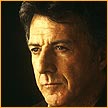
|
Achingly human
Moonlight Mile is full of enigmatic, eccentric lovable people
|
Arthur J Pais
By now many people have heard that Moonlight Mile is inspired from the tragedy that struck its writer and director Brad Silberling whose girlfriend, the television actress Rebecca Schaeffer, was murdered by a stalker in 1989. And how he continued to have a close relationship with her parents.
Whether you know this or not, you will be most likely be puzzled by the opening scenes of the movie. For here are the parents and fiance of a murdered young woman whose actions make you laugh.
Even if you have read Silberling's statement that the bereaved Schaeffer family went around their lives finding comedy and absurdity amidst an awesome tragedy, it takes some time to understand what is precisely at work in this moving, hilarious and life-affirming film. It takes time, too, to understand why the young man is staying with the bereaved family weeks after the tragedy. It takes a few minutes, too, to realise the parents of the murdered girl are laughing or getting angry so that they may not cry.
Moonlight Mile, which expanded from some 20 theatres to over 400 on Friday after showing to appreciative audiences for a week has Ashok Amritraj as an executive producer. In his two decade-long movie career, Amritraj, whose company Hyde Park Entertainment co-produced the film, has not made a film that is as compelling as Moonlight Mile.
Even as Joe Nast (Jake Gyllenhaal) lives with the dead woman's parents (Susan Sarandon and Dustin Hoffman) who now think of him of a son they never had, he suddenly finds himself falling for an eccentric postal worker. The movie is set in the 1970s and the postal worker is waiting for her man to return from Vietnam. Yet, she too has to take a decision when she falls for Joe.
The movie comes to a predictable end but not before Joe reveals a secret he was unable to share with anyone.
Pitted against two stalwarts, Sarandon and Hoffman, Gyllenhaal has a lot to do, but with his expressive face, and body language that speaks a lot about his vulnerability, he offers an impressive performance.
As the woman who cannot suffer fools, Sarandon who is cast with Hoffman for the first time, comes up with an electrifying performance. She plays a temperamental writer with a biting tongue and he, a commercial realtor, is overly solicitous of other people's feelings. She deals with her loss with anger, bitterness and sarcastic wit. He tries to face it by dreaming of a business venture with Joe.
In one of the major sequences in the movie, Sarandon in a spirited monologue reveals to Joe the secret of her marriage. The sequence, hilarious and heartfelt, alone is worth an Oscar. After several disappointing films like Sphere, Hoffman is remarkably impressive. Watch him dealing with his wife's anger when she criticises how one friend expressed her sympathy.
What could she have said, he asks. She doesn't want sympathy, she says. But she also hastens to add that she would be mad if they didn't offer it. "Put yourself in their shoes," he says.
There are several things that could have made the film better, apart from a better ending and a courtroom sequence that could have used less melodrama. Though many people have appreciated the movie's score that includes plenty of the wonderful music from the 1970s, Silberling's use of a number soon after every significant development in the film often works as a distraction.
Yet you cannot but help admire Silberling for turning the movie away from an overwrought melodrama and making it an achingly human drama filled with enigmatic, eccentric and lovable people.
Tell us what you think of this review